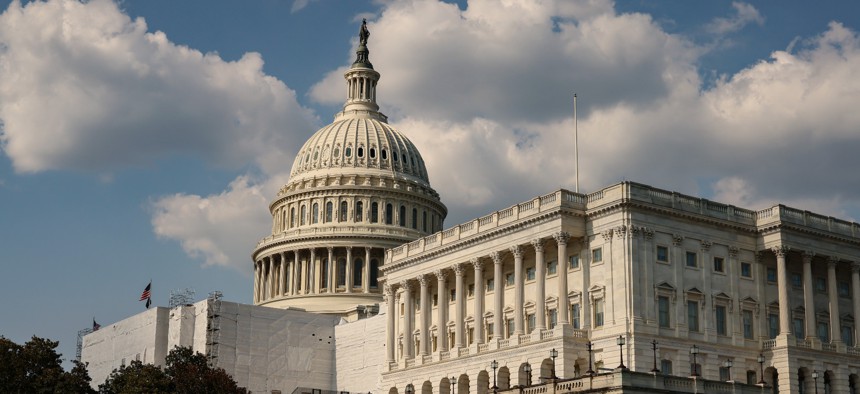Tech legislation to watch in Congress ahead of summer recess

Both House and Senate committees are advancing a range of legislation touching on everything from artificial intelligence to cyber workforce concerns. Jemal Countess / Getty Images
Among the bills considered is a new proposal from Sen. Gary Peters, D-Mich., to require agencies to designate chief AI officers, a position that currently exists at only a handful of agencies.
There’s a lot happening on Capitol Hill. The House Oversight and Accountability Committee marked up a slate of bills last week, and on Wednesday, the Senate Homeland Security and Governmental Affairs Committee got started on its own list of government-related bills focused on the government’s workforce, tech and cyber.
The senators didn’t make it to the government tech and workforce bills below that were on their agenda for the Wednesday meeting before recessing, but committee chair Sen. Gary Peters, D-Mich., said that the committee will pick the meeting back up “later this work period,” which closes at the end of the month. Here are the highlights.
Workforce and AI leadership
The House committee advanced two bills concerned with the government’s tech and cyber workforce out of committee last Wednesday.
The Modernizing the Acquisition of Cybersecurity Experts Act, introduced earlier this month by the chairwoman of the subcommittee on Cybersecurity, Information Technology and Government Innovation, Nancy Mace, R-S.C., and co-sponsored by Rep. Katie Porter, D-Calif, is meant to limit the use of educational requirements in government hiring of cybersecurity workers.
“This bill solves a simple problem… People who don’t attend or finish college are often barred from consideration for jobs in this field when really they shouldn't be,” Mace said during the markup. “Some of these young people literally have the skills to hack into critical federal IT systems, but they can’t get their foot in the door for employment at federal agencies.”
Making it easier to enter the field is a shared focus of many in the cyber workforce space, who have also pointed to the widespread use of certification requirements, even for entry-level jobs, as a barrier to entry in a field that desperately needs workers.
The House committee also reported out the AI Training Expansion Act, introduced this month by Mace — and this time co-sponsored by the tech subcommittee’s top Democrat Gerry Connolly, D-Va. The proposal would expand the training program set up by the 2021 AI Training Act to cover technology and data workers as well as supervisors and managers in government.
In the Senate, the Homeland Security and Governmental Affairs Committee is also set to try again on a workforce proposal from Sens. Maggie Hassan, D-N.H., and John Cornyn, R-Texas, called the Federal Cybersecurity Workforce Expansion Act.
Previously introduced in 2021 and proposed as an amendment for the fiscal 2023 National Defense Reauthorization Act, the bill would require the Cybersecurity and Infrastructure Security Agency to set up an apprenticeship pilot program to employ cybersecurity workers with the intention of hiring them permanently.
The bill would also require the Secretary of Homeland Security to establish a pilot program to train veterans and military spouses at no cost.
In the Senate, a new proposal from Peters called the AI Leadership to Enable Accountable Deployment Act — or AI LEAD Act — is also on agenda for the unfinished Wednesday markup.
It would require agencies to hire or designate a chief artificial intelligence officer tapped with promoting AI innovation and developing policies for how the tech is used. The director of the Office of Management and Budget would also be required to set up a Chief AI Officers Council and issue guidance requiring agencies to establish AI governance boards.
The proposal is one of several Peters has backed in recent months focused on the use of AI in the federal government in particular.
Tech and cyber proposals
The House passed a bipartisan proposal out of committee meant to push agencies to improve how they purchase software and associated licenses by requiring reporting on their software inventories.
Reintroduced in May by a group of lawmakers led by Peters, Sen. Bill Cassidy, R-La., and Rep. Matt Cartwright, D-Pa. — but first proposed in 2022 — the Strengthening Agency Management and Oversight of Software Assets Act has already been reported out of the Senate Homeland Security and Governmental Affairs Committee.
And a recently introduced bipartisan, bicameral proposal to reform the Federal Information Security Modernization Act — also known as FISMA — is on the Senate committee’s to-do list.
Released last week, lawmakers say that the bill would improve coordination on cybersecurity by requiring agencies to report cyberattacks to CISA and clarifying roles and responsibilities. This week, Senate Majority Leader Chuck Schumer, D-N.Y., included the bill in his list of what he wants added to the NDAA.
Finally, when the Senate Homeland Security and Governmental Affairs Committee picks back up, it will also have the bipartisan Legacy IT Reduction Act to consider, which would require agencies to put together inventories of their legacy tech and modernization plans. It was first proposed in 2022.
Other proposals considered by the two committees include a bill backed by Republicans that would require agencies to publish regulatory guidance online in one place; a proposal from Peters meant to improve transparency around government purchasing of data and a bipartisan bill meant to streamline the federal grants application process.






